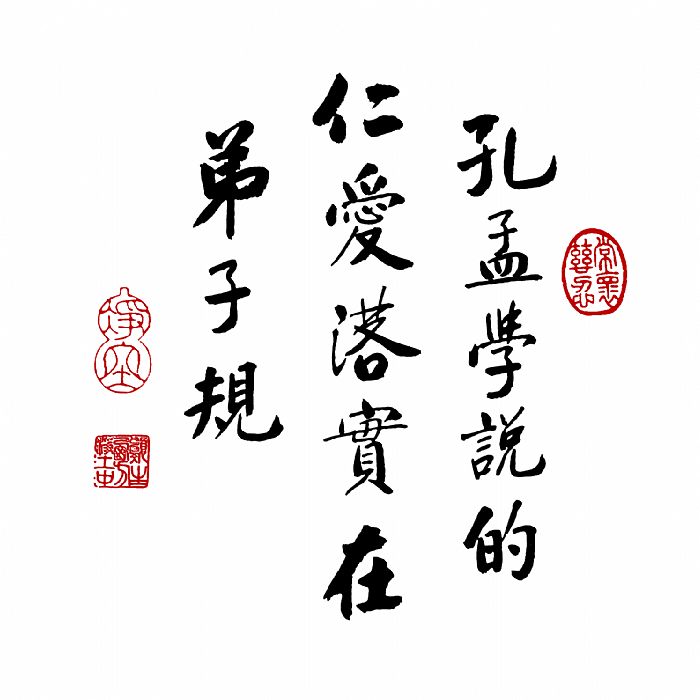【出则弟】INTERACTING WITH OTHERS AWAY FROM HOME
【兄道友。弟道恭。兄弟睦。孝在中。】
Older siblings should love and care for the younger ones;
younger siblings should love and respect the older ones.
Getting along well with one’s siblings is a sign of respecting one’s parents
and caring that they are happy.
【财物轻。怨何生。言语忍。忿自泯。】
When siblings value family ties more than possessions, resentment will not arise.
When siblings are careful with their words, feelings of anger naturally dissolve.
【或饮食。或坐走。长者先。幼者后。】
【长呼人。即代叫。人不在。己即到。】
When drinking, eating, walking, or sitting,
let elders do so first; younger ones follow.
When an elder is asking for someone, find that person right away.
If we cannot find that person, we should immediately report back and ask if we can help instead.
【称尊长。勿呼名。对尊长。勿见能。】
【路遇长。疾趋揖。长无言。退恭立。】
When addressing elders, do not call them by their first name.
When in the presence of elders, do not show off.
When meeting elders whom we know, greet them promptly and respectfully.
If they do not greet us in return, respectfully stand aside.
【骑下马。乘下车。过犹待。百步余。】
If we are in a vehicle and see an elder whom we know passing by,
we should get out and greet the person [if the situation safely allows].
We continue on our way only after the elder has left us.
【长者立。幼勿坐。长者坐。命乃坐。】
【尊长前。声要低。低不闻。却非宜。】
When an elder is standing, do not sit.
After an elder sits down, sit only when invited to do so.
Before an elder, speak softly.
But if our voice is too low and hard to hear, we are being improper.
【进必趋。退必迟。问起对。视勿移。】
【事诸父。如事父。事诸兄。如事兄。】
When meeting elders, walk briskly towards them;
when leaving, do not do so in haste.
When answering a question, look attentively at the person.
We should regard our aunts and uncles as if they were our parents,
and our cousins as if they were our siblings.
skip to main |
skip to sidebar














大自然音乐1

Labels
- 《孝经》 (8)
- 《孝经》卡 (1)
- Educational Poster (28)
- Environmental/环保篇 (11)
- Guidelines To A Happier Life (Dizigui English Version) (8)
- Healthy Food (3)
- Liao-Fan’s Four Lessons (2)
- Path to Peace (7)
- Recommendations (2)
- VSS News (1)
- 世界宗教是一家 (5)
- 人生 (18)
- 人生教育 (20)
- 健康篇 (16)
- 八德四维 (十二德目) (5)
- 功过格 (1)
- 命运-自我作篇 (11)
- 善行篇 (2)
- 子曰 (16)
- 孝篇 (10)
- 学习篇 (4)
- 宣言 (1)
- 小同学作品 (3)
- 弟子规学习卡 (41)
- 弟子规漫画 (24)
- 德育故事 - 孝篇 (18)
- 慈济歌 (1)
- 描红 (3)
- 教育图片 (10)
- 智慧语 (8)
- 格言 (3)
- 演讲 (1)
- 生活教育 (41)
- 真人真事 (1)
- 礼仪 (2)
- 科学根据 (6)
- 笔顺 (4)
- 群書治要 (8)
- 老人言 (8)
- 营养素食物 (8)
- 觉悟的教育 (14)
- 通告 (1)
- 静思语 (4)
- 墨宝 (5)


每一個宗教核心理念都是愛
和平钟声

Blog Archive
-
▼
2010
(199)
-
▼
November
(85)
- We are one
- Guidelines & Principles To Ensure A Happier Today ...
- Guidelines & Principles To Ensure A Happier Today ...
- Guidelines & Principles To Ensure A Happier Today ...
- Guidelines & Principles To Ensure A Happier Today ...
- 惜 时
- 我为你祝福
- 行立坐卧有威仪
- 忠恕之道
- 古之君子 以剑自卫乎?
- 君子有三畏
- 君子有三戒
- 德才兼备
- 忍能解决问题
- 感受别人的痛苦,增长自己的爱心
- 诚 实
- 立 志
- 节俭知足,平安到老
- 帮助别人要积极
- 兄友弟恭
- 懂礼貌,守规矩
- 勤劳好孩子
- 信心、毅力、勇气
- 伞是遮盖
- 弟子规学习卡 (28 of 40)
- 弟子规学习卡 (29 of 40)
- 弟子规学习卡 (30 of 40)
- 弟子规学习卡 (31 of 40)
- 弟子规学习卡 (32 of 40)
- 弟子规学习卡 (33 of 40)
- 弟子规学习卡 (34 of 40)
- 弟子规学习卡 (35 of 40)
- 弟子规学习卡 (36 of 40)
- 弟子规学习卡 (37 of 40)
- 弟子规学习卡 (38 of 40)
- 弟子规学习卡 (39 of 40)
- 弟子规学习卡 (40 of 40)
- 有两件事不能等
- 快乐面对己之命运
- 慎 言
- 小天使
- 生命的枯荣全视你怎么去栽培
- 品行一百分
- 仲由负米
- 寿昌弃官
- 李忠辟震
- 实夫拜虎
- 吴猛饱蚊
- 黔娄尝粪
- 老莱斑衣
- 陆绩怀橘
- 闵损芦衣
- 庭坚涤秽
- 江革负母
- 黄香温凊
- 孟宗哭竹
- 丁兰刻木
- 蔡顺拾椹
- 亲尝汤药
- 虞舜耕田
- Why It's Green To Go Vegetarian
- Think and Speak Carefully
- 消除不孝之习气
- 己不欲 即速已
- 勿以善小而不为
- Treat All With Respect
- 命自我作 福自我求
- 谢谢你哦!
- 《孝经》浅解 (四)
- 欢 喜
- 百善孝为先
- 舍 得
- 敬人者人恒敬之,爱人者人恒爱之
- 宽以待人
- 修身为本 教学为先
- 凡是人 皆须爱
- Help others but not harm
- 君子亦有忧乎?
- 一朝之忿,忘其身以及其亲,非惑与?
- Click on picture to see original size. 点击图片可看原图。
- 造如是因 得如是果
- 三思而后行
- Guidelines & Principles To Ensure A Happier Today ...
- Click on picture to see original size. 点击图片可看原图。
- Guidelines & Principles To Ensure A Happier Today ...
-
▼
November
(85)

Total Pageviews

生活在感恩的世界

是的,我是素食者


Join Me . . Go Veggie!

Thanks for being kind to animals *** 泛爱众 - 爱护人、爱护动物、爱护大自然

